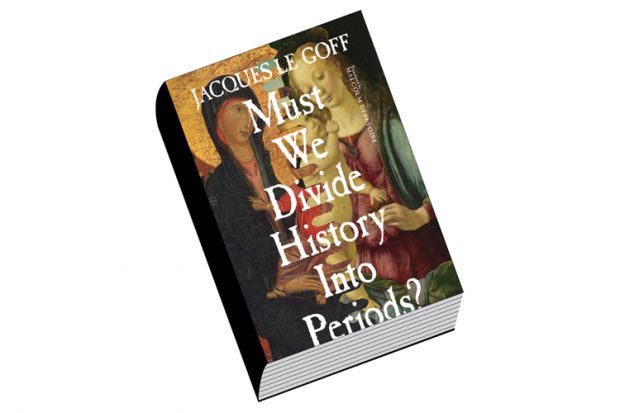When I was a junior lecturer, the medievalists in my department were not allowed to teach any text written after 1550. We were welcome to Thomas Wyatt but under no circumstances could we touch Spenser or – heaven forbid – Shakespeare.
Academic research and teaching are generally organised along such chronological lines, marked off into discrete sections or periods of time. But as Jacques Le Goff points out in this thought-provoking and eminently readable book, “There is nothing neutral, or innocent, about cutting time up into smaller parts.”
Taking the concept of periodisation as his main theme, Le Goff makes three key points. The first is that the answer to his title question, “Must we divide history into periods?”, is a definitive “yes”. Historical analysis, especially at the global level, can be truly meaningful only when it recognises epochal change.
His second point is that historians since the 19th century have tended to divide the past into periods that are too short. Fernand Braudel’s concept of the longue durée allows us to structure the past to accommodate both continuity and change. From this flows Le Goff’s third and killer point, that the Middle Ages and Renaissance are actually one historical period, not two.
Le Goff pursues this argument rigorously and elegantly, pointing out that the adoption of the term “Renaissance” as a discrete epoch distinguishable from the Middle Ages occurred only in the mid 19th century. He sets out the reasons why this distinction was embraced by modern historians, and then neatly undercuts their thinking. Classical Greek and Roman ideas were not suddenly retrieved in the 15th century but had a continuous traction throughout the medieval centuries; models of aesthetic form that we think of as “modern” did not spring fully formed during the Renaissance but were already evident in Gothic cathedrals, in the work of medieval Italian artists such as Giotto and in the medieval innovation of the personal portrait.
Even the Reformation, often regarded as the pivotal moment between the Middle Ages and the Renaissance, was not a sufficiently major turning point to mark a new era, but another manifestation of religious change on a continuum from the beginnings of Christianity to the age of the Enlightenment. Whether we look at religion or technology, art or government, industry or printing, science or historiography (and Le Goff covers all these), in his view no decisive paradigm shifts occurred between the fall of the Roman Empire and the onset of the Enlightenment in the middle of the 18th century.
Oddly for a Marxist historian, Le Goff fails to pursue the economic reasons why this particular division of time separating the Middle Ages from the Renaissance is not “neutral or innocent”. The idea of the Renaissance has become an area of hegemonic power in the modern world. Its intellectual phenomena are sites of prestige and commodification in academic and professional circles, guaranteeing the reproduction of the Renaissance at the expense of the Middle Ages.
As a medievalist, I find myself strangely drawn to his argument, which fits the current zeitgeist for cross-boundary research. This is Le Goff’s last book, barely finished before his death in April 2014, and its characteristically polemical but highly rational style reminds us of what we have lost.
Helen Fulton is professor of medieval literature, University of Bristol.
Must We Divide History Into Periods?
By Jacques Le Goff
Columbia University Press, 184pp, £20.00
ISBN 9780231173001 and 1540407 (e-book)
Published 8 September 2015
POSTSCRIPT:
Print headline: Discrete eras are so last century
Register to continue
Why register?
- Registration is free and only takes a moment
- Once registered, you can read 3 articles a month
- Sign up for our newsletter
Subscribe
Or subscribe for unlimited access to:
- Unlimited access to news, views, insights & reviews
- Digital editions
- Digital access to THE’s university and college rankings analysis
Already registered or a current subscriber? Login




